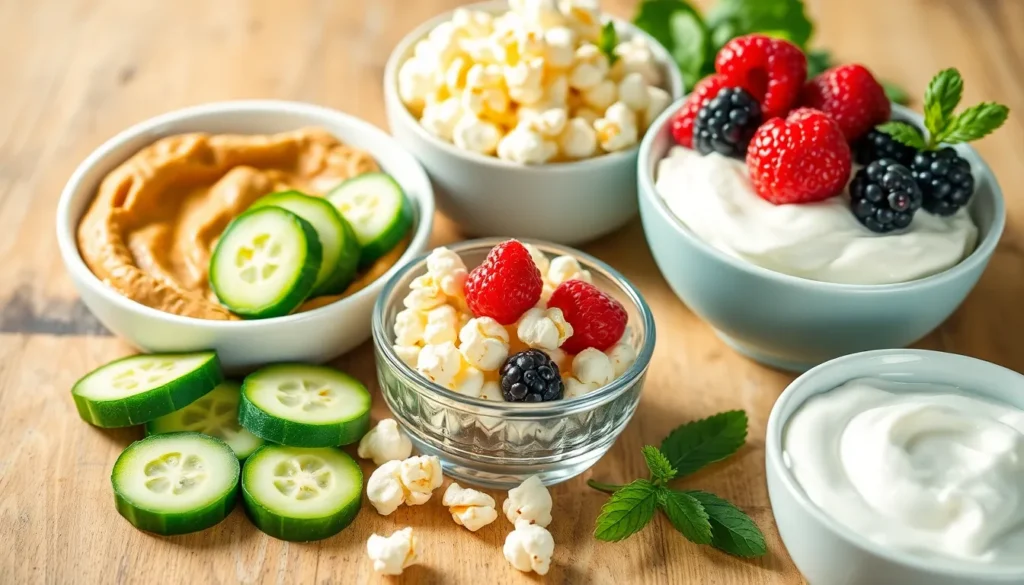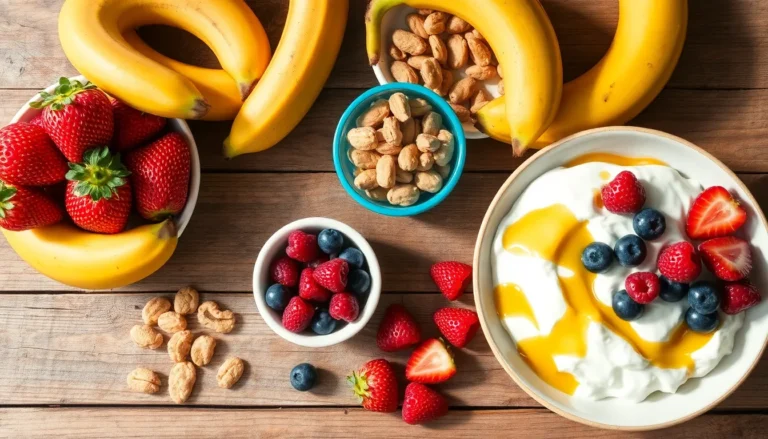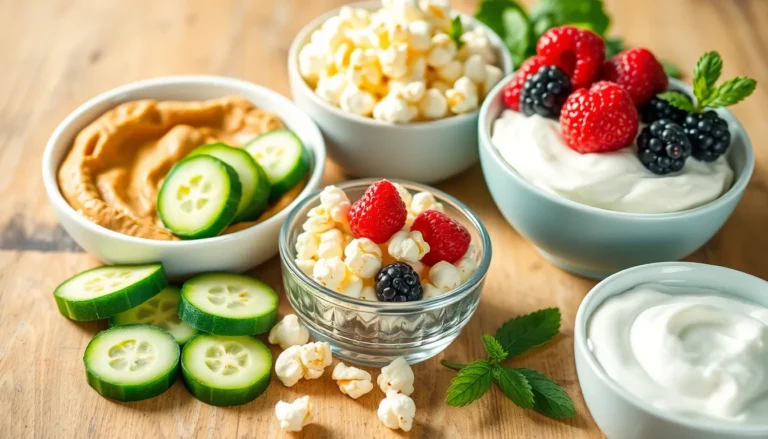Table of Contents
ToggleSnacking doesn’t have to be a guilty pleasure or a calorie catastrophe. In a world where every bite counts, low-calorie snacks are the superheroes of the snack aisle, swooping in to save taste buds from boredom and waistlines from disaster. Imagine munching on something delicious without the dreaded food coma or the remorse of a calorie overload. Sounds like a dream, right?
What Are Low-Calorie Snacks?
Low-calorie snacks are food options that contain fewer calories than traditional snacks. Typically, these snacks provide under 100 calories per serving, making them an excellent choice for those looking to control their calorie intake. Fruits, vegetables, and whole grains often serve as the base for these nutritious bites.
Examples include sliced cucumbers or baby carrots paired with hummus, air-popped popcorn, or Greek yogurt with berries. Each of these options offers flavor and satisfaction without excessive calorie counts. Many people incorporate low-calorie snacks during the day to curb hunger or as a post-workout treat.
Consumers appreciate the variety available among low-calorie snacks. Snack bars containing nuts and seeds provide energy with lower calorie counts. Lightweight rice cakes topped with almond butter also present a filling choice.
Nutrition labels indicate the caloric content, allowing consumers to make informed choices. It’s easy to identify snacks with higher fiber or protein content, which increases satiety. Opting for snacks rich in these nutrients can promote sustained energy levels throughout the day.
Ultimately, low-calorie snacks deliver a delicious way to enjoy eating without the guilt of overindulgence. They fit seamlessly into various dietary preferences, whether one follows vegetarian, vegan, or gluten-free lifestyles. Choosing low-calorie options contributes to overall health and well-being while satisfying cravings.
Benefits of Low-Calorie Snacks

Low-calorie snacks offer various advantages for those looking to enjoy food without excess calories. These benefits enhance a balanced diet while satisfying cravings.
Weight Management
Weight management becomes easier with low-calorie snacks. Consuming these foods helps individuals control hunger between meals, reducing the likelihood of overeating. Studies indicate that incorporating snacks under 100 calories effectively supports weight loss efforts. Sliced vegetables, air-popped popcorn, and yogurt represent excellent choices that provide satisfaction without adding significant calories. Choosing low-calorie snacks allows individuals to stay within their daily calorie limits while enjoying a variety of flavors and textures.
Nutritional Value
Nutritional value plays a crucial role in the benefits of low-calorie snacks. Many options are rich in essential nutrients, including vitamins, minerals, and fiber. A snack like Greek yogurt with berries delivers not only protein but also antioxidants and probiotics. Foods like hummus and vegetables supply protein and fiber, fostering greater satiety. Selecting snacks with high nutritional content allows individuals to nourish their bodies while managing calorie intake effectively.
Popular Types of Low-Calorie Snacks
Low-calorie snacks come in various forms, helping individuals stay satisfied without excess calories. Here are some popular types of low-calorie snacks.
Fruits and Vegetables
Fruits and vegetables offer refreshing flavors and essential nutrients. Sliced bell peppers, celery sticks, and cherry tomatoes serve as crunchy, low-calorie snacks. Fruits like apples, berries, and watermelon provide natural sweetness with minimal calories. These options are often high in fiber, promoting fullness and reducing the urge to snack excessively. Dipping vegetables in salsa or pairing fruit with a small amount of yogurt enhances taste without adding many calories.
Nuts and Seeds
Nuts and seeds supply healthy fats and protein, making them satisfying snack choices. Almonds, walnuts, and sunflower seeds contain beneficial nutrients while remaining lower in calories when consumed in moderation. A small handful of nuts or a tablespoon of seeds can curb hunger effectively. They also provide a satisfying crunch alongside nutritional benefits. Choosing unsalted varieties retains health benefits without excess sodium.
Whole Grain Options
Whole grain snacks deliver energy and fiber while keeping calories low. Air-popped popcorn, plain rice cakes, and whole grain crackers are tasty examples. These snacks help maintain feeling full longer, supporting weight management goals. Pairing whole grains with hummus or a light spread can boost flavor and nutritional value. Opting for snacks made from oats or barley can enhance fiber content further, promoting digestive health.
How to Choose Low-Calorie Snacks
Selecting low-calorie snacks involves understanding nutrition labels and managing portion sizes effectively.
Reading Nutrition Labels
Understanding nutrition labels plays a crucial role in choosing low-calorie snacks. Look for snacks with fewer than 100 calories per serving, ensuring they fit within dietary goals. Nutritional elements like fiber and protein boost satiety, so seek options with high values. A snack containing at least 3 grams of fiber can promote fullness, while snacks with 5 grams or more of protein enhance satisfaction. Ingredients list also matters; prioritize snacks with whole, recognizable ingredients over processed options. This ensures better nutritional quality while keeping calories in check.
Portion Control
Effective portion control ensures that low-calorie snacks remain satisfying without leading to excessive calorie intake. Measuring serving sizes helps maintain balance, preventing mindless eating. A single serving of nuts typically contains around 1 ounce or 28 grams. Keeping small containers of pre-portioned snacks can help avoid larger servings. For fruits and vegetables, fill up plates or bowls to create the illusion of abundance while staying low in calories. Using smaller plates for snacks can trick the eye into seeing a fuller plate, promoting satiety.
Low-calorie snacks provide a practical and enjoyable way to satisfy cravings while supporting health goals. With a wide range of options available it’s easy to find snacks that fit personal tastes and dietary needs. These snacks not only help manage hunger but also contribute essential nutrients that promote overall well-being.
Incorporating low-calorie snacks into daily routines can make a significant difference in maintaining energy levels and preventing overeating. By choosing wisely and paying attention to portion sizes individuals can enjoy guilt-free snacking that aligns with their lifestyle. Embracing these tasty alternatives can lead to healthier eating habits and a more balanced approach to nutrition.






